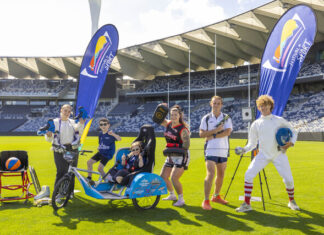Andrew Mathieson
IT looks a throwback to yesteryear, but just like the 33-year-old’s funky, retro sideburns, Cameron White looks a part of the furniture.
In an era of multi-million dollar indoor sport complexes springing up all over the place, Belmont’s Club Reflex still retains some old-fashioned charms.
“It feels like a second home,” Cameron, who runs the squash centre, nods.
Players have to trudge their way down narrow hallways just to reach the changerooms.
Then they are greeted to a bunch of flowers on the wash basin, ferns hanging off the walls and frosted glass doors on the showers.
A couple of archaic squash courts are converted into a gritty-looking gym and in days of healthy choices, sweet-tasting snakes and other confectionery still line the front counter.
The man, who sells the racquets, runs court hire and weekly competitions, then coaches on the side, is no mug and breathes the business.
“But I knew I’d never have a real job,” he laughs.
“I have never known coming up through school what I wanted to do.”
So Cameron instead played on the professional circuit – and then racquetball, even better – that started after the 10-year-old was watching dad play on a Numurkah back squash court.
He would reach number 48 in world rankings, but sacrificed cash riches to improve his game and see the world.
“You’re not out there, making big dollars in squash that you could potentially do if you were working a normal job,” Cameron says.
“But if you were back home, you’re not travelling to Egypt and seeing the Pyramids, you’re not in Malaysia eating on the streets or you’re not breathing New York.
“You can’t put a dollar amount on that.”
That sometimes meant sleeping in an airport when he had no money or staying at a dodgy Pakistani motel that were overran with cockroaches.
But the turning point for walking away from competitive squash was missing out on a spot in the Australian team for the 2006 Commonwealth Games.
The game itself still lies at the bottom of his heart, but sure enough racquetball fills up his trophy cabinet.
Nine Australian racquetball titles, including the past eight, are testimony to that.
“It’s one of those things – everybody asks how many have you won, but I don’t really count,” Cameron insists.
“All I say is the more you win, the older you get.”
The bouncier ball and bigger racquets makes the sport a good option compared to squash when the body ages and the knees give out.
But Cameron has broken the stranglehold of racquetball’s friendly etiquette of prolonging long rallies.
“A lot of the traditional racquetballers just tend to keep the ball in play, waiting for an error, a bit like squash use to be like in the 1970s,” he says.
“I tried to think that a bouncier ball gives you more time to get into position to play a better shot.”
Racquetball success ran parallel to Cameron’s move to Geelong just over a decade ago with wife Sally.
They were teenagers when they met at the Victorian Institute of Sport as budding squash players, but a back injury forced Sally to quit squash prematurely.
Not that it’s a bad thing for the Grovedale family – and their two little girls.
Cameron hesitates for a moment, before flippantly hinting she’s not always been his best partner.
“We were traditionally not great with each other on court,” he smiles.
“Sometimes I just think husbands and wives can’t work that well together when you’re trying to get the best out of yourself.”
Working up a racket
Digital Edition
Subscribe
Get an all ACCESS PASS to the News and your Digital Edition with an online subscription
Bounce into the Festival of Sport
GMHBA Stadium will open to the public, allowing people to explore the various sports available across Greater Geelong during a free community event. ...








